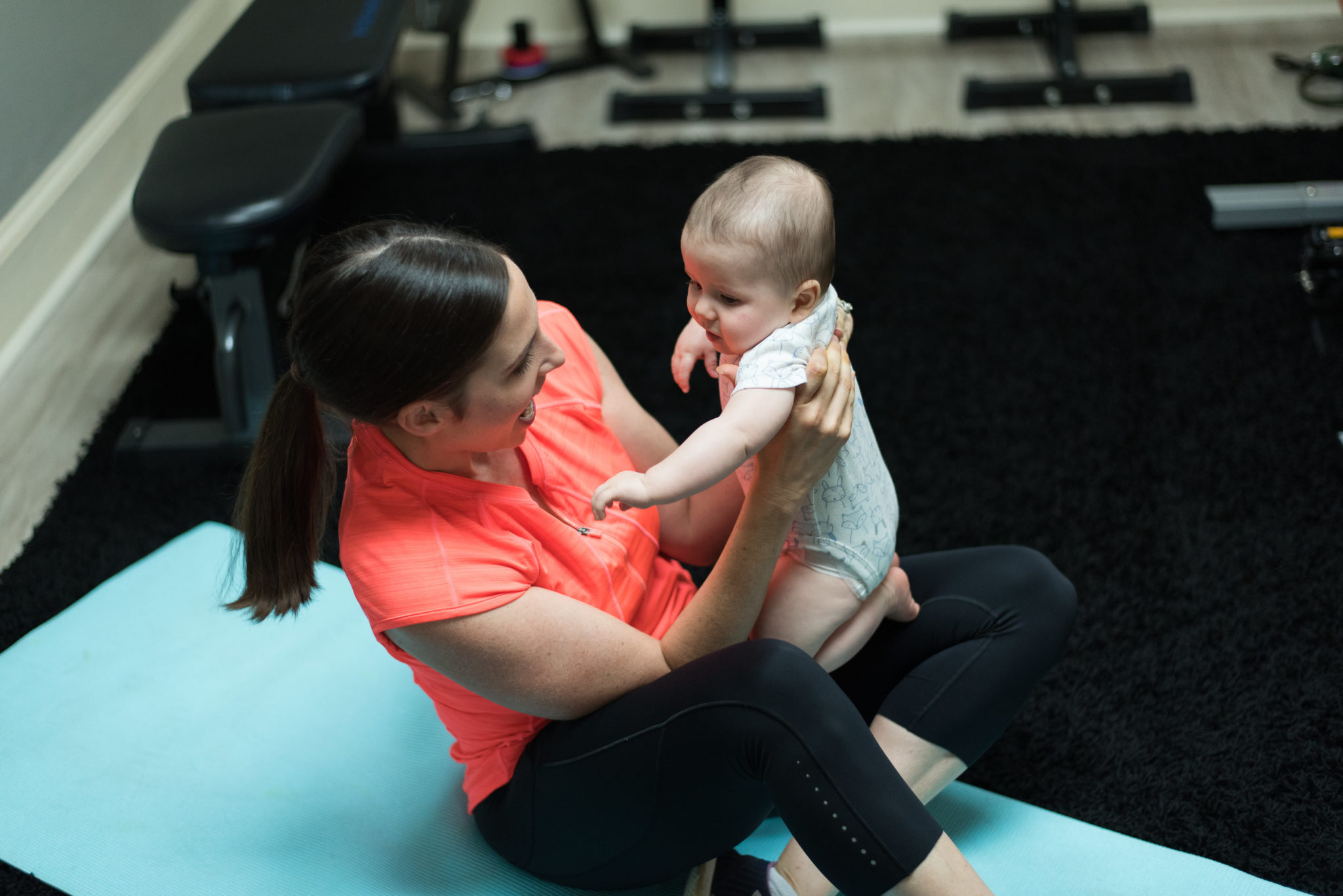You may have noticed that I have not been around much lately. Let me explain – in January of 2024, I was putting away my kid’s laundry when I bent over and accidentally smacked my forehead on an open drawer. What followed was a 15-month battle with post-concussion syndrome. I suffered from dizziness, headaches, and vision problems. Being a good coach to my clients, let alone creating Instagram content, became impossible.
The journey to healing has reminded me of my journey to recover from out-of-control PCOS;
- First, there was the expensive and time-consuming struggle to get diagnosed.
- Next came the disappointing realization that there was not much my doctor could do but kindly offer me drugs that had life-interupting side effects. (At least this time, no one tried to tell me that weight loss would solve all my problems!)
- Then, I realized that a holistic approach was the only path forward—a blood-sugar-balancing diet, regular workouts, massage, physical therapy, and stress management for the win!
Returning with Intention & Purpose
After a year-long hiatus from work and social media to recover from post-concussion syndrome, I knew my return had to be purposeful. Like many women with PCOS, my TBI taught me how crucial it is to listen to our bodies, prioritize healing, and step back when needed. But when I was ready to step forward again, I wanted that step to mean something bigger than just returning to business as usual.
That’s why I traveled to Washington, D.C., this March—to meet with legislators and advocate for PCOS to become a national priority. I came back not just to resume my work as a PCOS personal trainer but to push for the change our community so desperately needs.
The Reality: What Women with PCOS Are Still Facing
PCOS affects 10-15% of women, yet it remains underdiagnosed, misunderstood, and underfunded. Women with PCOS are at increased risk for serious health conditions, including Type 2 diabetes, cardiovascular disease, endometrial cancer, and infertility. The economic burden of PCOS in the U.S. alone exceeds $15 billion annually, yet funding for PCOS research lags far behind other conditions with similar prevalence and impact.
Many of my clients struggle with symptoms that affect their daily lives—chronic fatigue, weight fluctuations, hormonal imbalances, and mental health challenges like anxiety and depression. PCOS is more than just a reproductive issue; it’s a lifelong metabolic and endocrine disorder that demands more medical attention, research, and support.
PCOS Awareness in Action: The 2025 PCOS Advocacy Day in Washington
During the 2025 PCOS Advocacy Day, I joined PCOS Challenge and other advocates to speak directly with lawmakers about the urgent need for increased research funding and better diagnostic tools. Our legislative asks included:
1. Increase Funding for Polycystic Ovary Syndrome Research Through the NIH
PCOS is linked to serious health risks—diabetes, cardiovascular disease, endometrial cancer, and stroke—yet funding for research remains disproportionately low. Our key request was for Congress to prioritize increased funding through the National Institutes of Health (NIH) to:
- Improve diagnostic tools (because we’re tired of waiting years for answers).
- Develop better, targeted treatments (because birth control and metformin aren’t one-size-fits-all solutions).
- Advance research into PCOS’s root causes (because it’s about time we understand why this happens).
2. Standardizing Hormone Testing for Earlier, More Accurate Diagnosis
Right now, getting a proper PCOS diagnosis is like playing medical roulette—some doctors rely on irregular periods, others look at ovarian cysts, and many don’t test hormones at all. We pushed for the CDC to standardize hormone testing, especially for testosterone and Anti-Müllerian Hormone (AMH), to improve early diagnosis and ensure consistency in medical research.
Standardized hormone testing could mean fewer misdiagnoses, better tracking of PCOS progression, and more effective treatment plans. Imagine a world where doctors take PCOS seriously from day one instead of gaslighting women into thinking “it’s just stress” or “losing weight will fix it.” We need science-backed solutions, not medical guesswork.
3. Official Recognition of PCOS Awareness Month
One of the simplest but most impactful legislative asks was for Congress to pass a resolution officially recognizing September as PCOS Awareness Month. Increased awareness leads to better education, earlier diagnosis, and more funding for research.
It’s wild that PCOS affects millions of women, yet so few people—even within the medical community—genuinely understand its impact. An official PCOS Awareness Month would:
- Encourage more public health campaigns about PCOS symptoms and risks.
- Push for better medical training for healthcare providers.
- Destigmatize PCOS and its symptoms, from infertility to hirsutism.
4. Strengthening the PCOS Caucus in Congress
You’re not alone if you’ve never heard of the Bipartisan Congressional PCOS Caucus. It’s a relatively new initiative, but it’s our strongest tool for pushing long-term legislative change. The more members of Congress we can recruit, the more attention and funding PCOS will receive.
We urged lawmakers to join the PCOS Caucus and take an active role in advocating for:
- Increased federal funding for PCOS research.
- Expanded insurance coverage for PCOS-related treatments, including fertility care and mental health support.
- Policies that promote better treatment access for all women with PCOS, regardless of income level.
On previous advocacy days, I saw firsthand how little awareness existed at the policy level. This year, I saw the power of advocacy—how sharing real stories and real numbers can shift perspectives and open doors to change. Nearly every legislative staff member I met with knew someone living with PCOS, and they were eager to learn what their offices could do to help. For example, Senator Ossof promised to ask his wife (an OBGYN) to educate him further on the issues surrounding PCOS. And Representative Nikema Williams’s staff committed to supporting the house’s 2025 PCOS awareness month resolution.
A Bigger Mission: Where My Work Is Headed Now
This trip reinforced why my work as a PCOS personal trainer goes beyond workout videos and expert advice. Exercise and nutrition are critical tools for managing PCOS, but they are only part of the equation. People living with polycystic ovary syndrome need systemic change—better medical care, earlier diagnoses, and more research funding. My mission moving forward is to continue bridging the gap between personal health and national advocacy, empowering women to take control of their bodies while pushing for the larger structural changes we need.
I also want to create more educational resources so that women with PCOS feel empowered when they walk into their doctor’s office. Too many women are dismissed or told to “just lose weight” when their symptoms are complex and require medical intervention. My work will continue to focus on science-backed strategies that improve hormonal balance, metabolic health, and overall well-being.
An Invitation to Join the Movement
PCOS is a national health crisis that demands attention, and advocacy is not a solo effort. If you believe PCOS deserves more awareness, more research, and more resources, I invite you to be part of this movement. Here’s how you can support PCOS advocacy from wherever you are:
- Email or call your representatives. Tell them that PCOS research and funding should be a priority. (An easy template letter is available here.)
- Share your story. Whether it’s on social media, in a blog, or just in conversation—raising awareness starts with us.
- Support organizations like PCOS Challenge. They’re leading the charge for PCOS legislation, research funding, and public awareness campaigns.
This isn’t just about us—it’s about future generations of women who deserve better care, better answers, and a healthcare system that actually prioritizes their needs. PCOS Advocacy Day 2025 was a step forward, but the fight isn’t over. Let’s keep pushing together.
Imagine a future where every woman with PCOS gets diagnosed early, has access to the best treatments, and feels truly supported in her journey. That future is possible—but only if we demand it.
Let’s make PCOS a national priority because every woman with PCOS deserves to be seen, heard, and supported.






